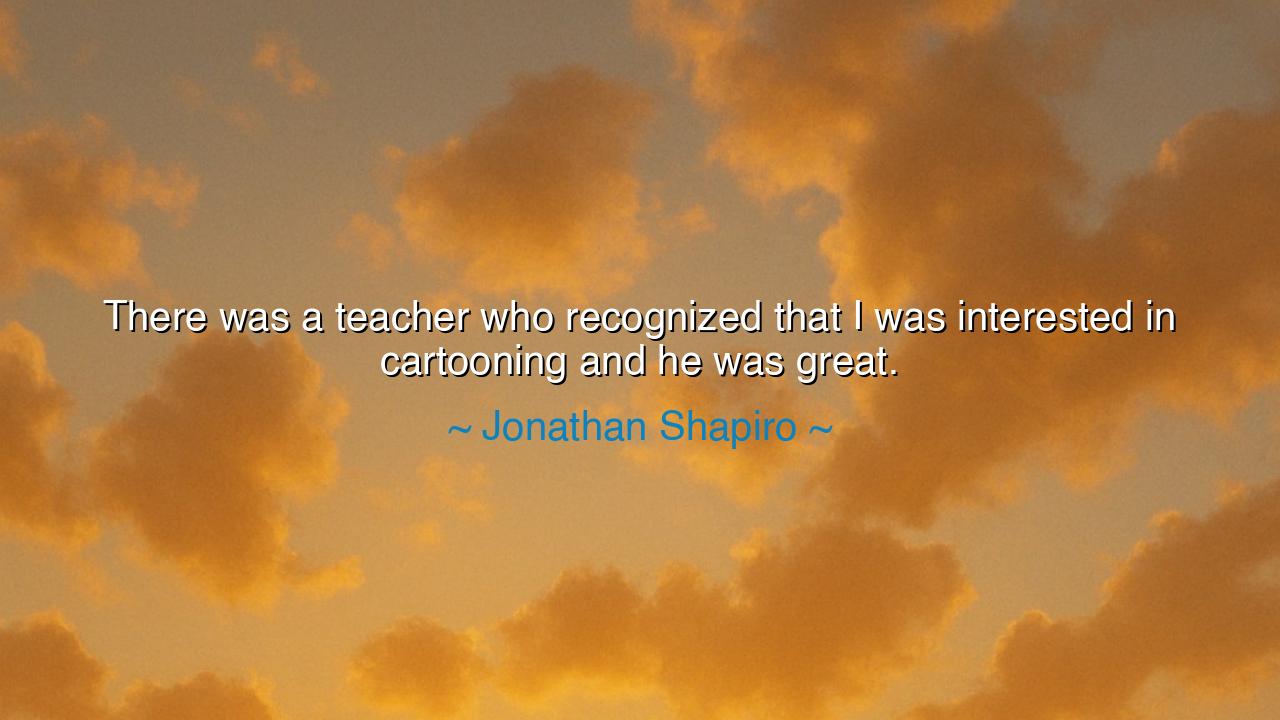
There was a teacher who recognized that I was interested in
There was a teacher who recognized that I was interested in cartooning and he was great.






“There was a teacher who recognized that I was interested in cartooning and he was great.” Thus spoke Jonathan Shapiro, the political cartoonist known as “Zapiro,” whose art has cut to the heart of power with wit and courage. In this short memory lies a timeless truth: that one teacher’s recognition can ignite the flame of destiny in a young soul. For the child often does not yet know the worth of their own gift until it is seen, named, and affirmed by another.
The meaning is profound. Shapiro did not say that his teacher taught him everything about cartooning, nor that the teacher drew in his stead. Rather, he says, “he recognized.” To recognize is to see beyond the ordinary, to notice what might be overlooked, to say with the authority of care: “This spark within you matters.” In that act of recognition, the teacher bestowed dignity upon the student’s passion. And this dignity gave Shapiro the courage to walk the path of his gift, even when the world might have considered it trivial.
Throughout history, such moments of recognition have altered the fate of individuals—and through them, the fate of nations. Consider Albert Einstein, a boy who struggled in the rigid schools of Germany, dismissed as slow and distracted. Yet it was a teacher who once spoke to him with encouragement, seeing not a failing student but a mind restless with questions. That recognition nourished the boy’s persistence, and from it came the theories that would reshape science itself. One teacher’s insight, one moment of faith, can tilt the axis of history.
The words of Shapiro also remind us that the power of a teacher lies not only in knowledge, but in encouragement. Facts can be learned from books, but belief in oneself is often born from the voice of another. When the teacher told him that his interest in cartooning was worthy, he was not merely instructing; he was conferring strength. And strength, once given, multiplies. From this seed came an artist who would wield his pen as a sword, challenging corruption, speaking truth through humor, and shaping public conscience.
The story carries within it a call to all who guide others: see your students. Do not merely test them against the same measure, but look for the hidden spark in each. One may love words, another numbers, another the play of images. Do not scorn these passions as distractions, for in them lies the seed of greatness. To dismiss a child’s gift is to snuff out a flame; to recognize it is to light a torch that may burn for generations.
The lesson, then, is both personal and universal. If you are a student, cherish the memory of those who recognized you, and let their words be a compass. If you are a teacher, mentor, or parent, take upon yourself the sacred duty to watch carefully, to listen deeply, and to affirm generously. Your recognition may seem small, but to the one who receives it, it may mean everything.
Therefore, dear listener, let Jonathan Shapiro’s words be carved into your heart: recognition is power. Practice it daily. Recognize the talents of those around you, however humble, however unusual. Speak encouragement into their passions. For in doing so, you may set in motion a destiny far beyond what you can see. And when the story of their life is told, perhaps they too will say of you: “There was someone who recognized me—and they were great.”






AAdministratorAdministrator
Welcome, honored guests. Please leave a comment, we will respond soon